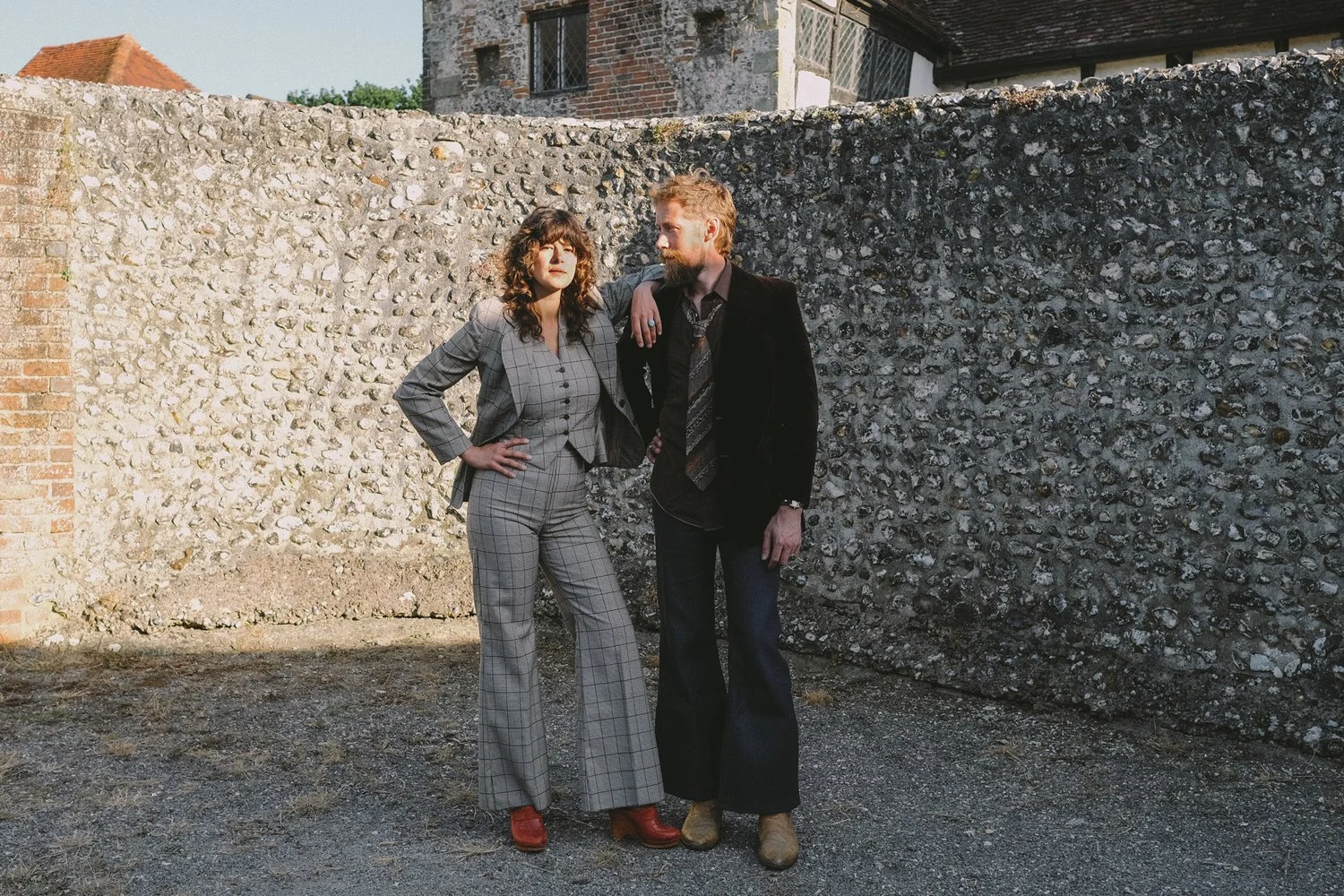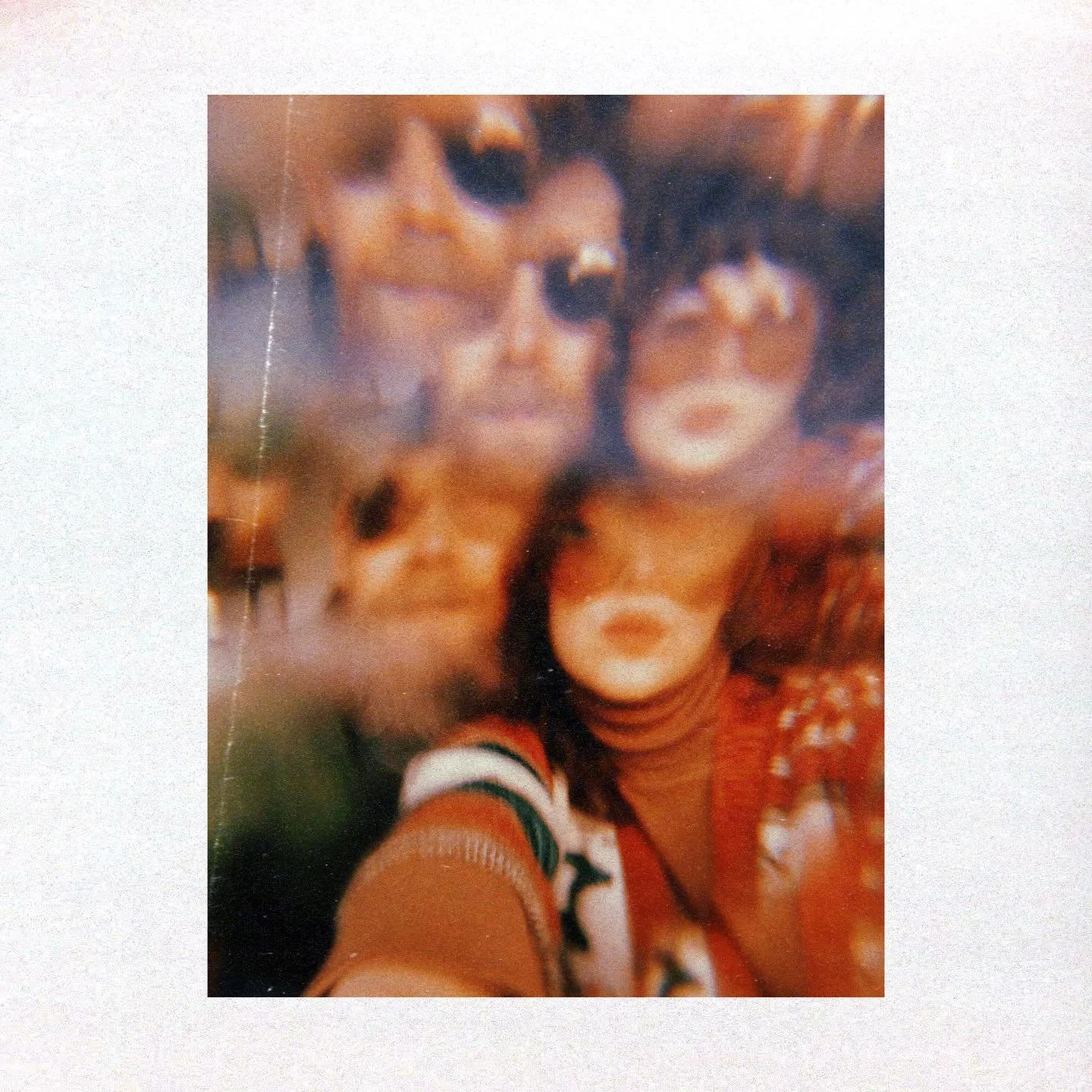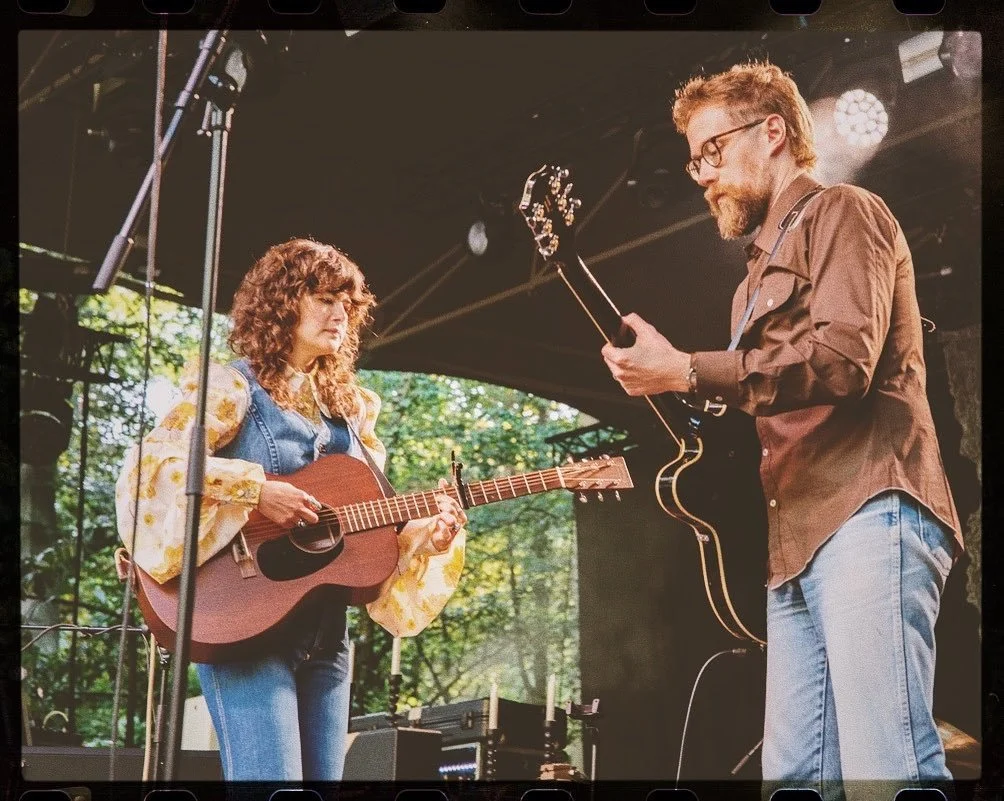Devin Tuel & Stephen Harms - Native Harrow Interview
West Sussex based folk duo Native Harrow consists of Devin Tuel and Stephen Harms. Both bring together a cosmic partnership that is both consistent in the vain of the greats of the day as well as their poetic justice to express themselves flawlessly! In this interview we explore both of their youths, early influences and what got them in the music, releases such as “Soroses”, “Happier Now”, and “Old Kind Of Magic” as well as what they’ve got cooking this summer.
When and where were you born? What was your childhood like growing up? When did you first begin to fall in love with music? Was this something that was relevant around your household growing up?
Devin- I grew up in a wooded suburb of Philadelphia. I was a ballerina from age 3 and danced until I dropped out of a theatre programme while I was studying for my bachelors in fine arts in New York City. It was there that I began writing songs and setting poems I had written to music. I’ve always sung in choirs, theatre productions, and with my family. Music is a huge part of my upbringing; there was always a record on and we always all sang together on family road trips. My Dad taught me to play guitar & sing harmony and was a massive influence on me musically. He introduced me to the Laurel Canyon & 70s rock music that shapes and informs my own music & songwriting. I’ve always listened to classical music from all of my years dancing, and since meeting Stephen I have learned more about jazz and grown to love & draw inspiration from that world as well.
Stephen- I grew up all over: mostly Montana, Arizona, and Colorado, with some time at 3,980 metres elevation in the Andes mountains in Argentina, a cattle ranch in Missouri, and a few other stops along the way. I’ve realised recently that all of the moving around during my childhood probably pushed me to go in a little more, and music became a big part of that. My mom is a folkie first and foremost, but with a deep love for CCR and blues, from Chess Records through to Stevie Ray Vaughan. My dad was a big Doors guy, I think he was more of a rocker but with some eclectic choices. I remember that the first song that transfixed me was “Something” by The Beatles, when we moved back from South America. I sat at the piano in my Grandparents’ house for an afternoon playing the opening theme over and over and over.
What would you and your friends do for fun growing up? Who were some of your earliest influences in your more formative years? When and where was your first concert and when did you realize you wanted to spend your life pursuing and creating music?
Devin- Growing up my two sisters were my best friends. We spent all of our free time playing in the woods, daydreaming together, and just being free out in the country. It was a gift our parents gave us to have that space to grow and explore in. As a result, nature is a massive part of my life and writing. I remember being home once with my Dad, I must have been 3 or 4, and he put CSNY’s Deja Vu on the turntable and at full volume just let me hear that album. I remember the harmonies and just this sound, it made me feel like I was flying. To this day I feel those songs deep in my soul and it gives me the butterflies to listen to, every time. My first concert was Paul McCartney at the Wells Fargo Arena in Philly. My Dad took me & my sisters. We even waited and watched Paul drive in for the gig (he stopped to wave at us all), it was incredible. The Beatles were like religion in my house. Every Sunday we’d make pancakes and listen to The Beatles. I always knew I wanted to be in the arts. I’ve been creative my entire life and from crafting to songwriting, dancing, and acting I really love it all. I found my own voice with my songs during college when I was tired of performing other peoples’ work and wanted to focus on my desire to connect with people thru my own storytelling. My first gig was at The Bitter End in Greenwich Village.
Stephen- My pastimes seemed to shift with each move and each new friend group. Montana in elementary school was lots of snowboarding, winter sports, and the great outdoors. Jr. High in Arizona was skateboarding and basketball, until I joined a garage band. By the time I moved to New York and then Colorado for high school, it was pretty much only music. The music I listened to the most as a kid would have been The Beatles, Zeppelin, Pink Floyd, some Sabbath, and then a deep dive into bebop and hard bop (which I was trying to play on trombone and later saxophone). As I started playing bass and then got more into composing and conducting, I went through a Motown and Stax phase, a solid year of Weather Report and Jaco, and then several years of Shostakovich and 20th century composers. The first concert I went to with my friends was Pearl Jam at Veterans Memorial Coliseum. I think I always knew it was music, for me. Always.
Did you participate in any groups, or projects prior to Native Harrow? How did you guys initially meet each other and what led to the decision to put the band together? Tell me about the band’s debut album “Ghost” that was released in 2015. When and where did recording begin and what was the overall approach with this being a first for the group?
Devin - Other than many ballets, musicals, plays, and choirs, Native Harrow is the first band I have ever been in. I was a solo artist for about 3 years before meeting Stephen thru a friend. He was playing bass in their band and we all toured together. From the first gig Stephen sat in on bass with me and it was just natural, we connected on a very deep and sweet level which led to us falling in love and starting our band. We made Ghost over about 6 months of recording during various moves around the States. From a flat in Hoboken, NJ to a basement in Golden, CO and even a house sitting job in Nashville - we recorded it all ourselves with junky gear or borrowed bits from friends. The only vision we had was making something we felt held and showcased the lyrics. That’s always been at the forefront of our ethos. It’s lyrics I write and Stephen building a sound world that echos what I’m singing about. We build those worlds together and I think Ghost is a really sweet first example of that journey.
Stephen- I’ve been gigging and recording in bands/orchestras/ensembles since I was 11, or 12 on double bass, electric bass, cello, brass, keyboards, guitar, banjo, mandolin, drums, oud, saz, and a few other things and have played just about every kind of music in the process. My undergrad is in double bass and conducting, and my masters are in music theory/composition and musicology. When I met Devin, I was also living in New York, playing jazz, free improvisation, maqam, folk, recording sessions, off-broadway, orchestra, and chamber music gigs. For me, Ghost was kind of an experiment. Devin and I had toured a lot the year before, playing a repertoire of songs ostensibly as a folk duo. Ghost was an attempt to retain that very stripped back approach, self-record (on a shoestring budget with very limited equipment), and begin to develop a bit of a voice for what it was the two of us wanted to do together. I feel like it’s a pretty reasonable first step towards the kind of music we (still) want to be making today.
2017 saw the group’s follow up “Sorores”. How did you guys want to approach this record that differs from the previous work? Can you tell me about writing and recording songs such as “Book Of Tongues”, “A Year” “For Nothing” and “All Too Much”?
Devin - For me, Sorores was written during a period of challenging times. Moving around a lot. Bad gigs, bad luck. I felt beaten down by life in some ways which is reflected in some of the songwriting. I don’t think I really talked about it at the time. The era for me was one of growing pains, taking risks, true struggle with the industry and trying to find my footing. I found this low drone tuning that felt exactly like how my soul felt. Low but hopeful. I wrote all but one song on Sorores in that tuning. I just wanted to live in my sorrow for a while. To acknowledge it and then put it down and move on. I’m really proud of this record now. It feels akin to an art exhibition to me. It’s a world and you are either able to get into it and ride the wave or not.
Stephen- Some of our later records feel a bit more like piecing together a puzzle, or weaving a tapestry, telling a story that goes a few very different places, artistically, sonically, emotionally, and aesthetically, but doing our best to keep it all together, and feeling cohesive. In contrast, Sorores feels like it was an 80-minute trip to a very specific world with a very specific set of rules for living. The drone tuning that Devin mentioned is a part of that, but I think that record, double record actually, really just wanted to be a world unto itself. We haven’t repeated that approach on another record, and I think it makes it a unique document of us at a very specific place and time. I really like how vicious Devin’s electric guitar playing is on “Book Of Tongues.” I named that song and it was Devin’s first time playing electric guitar. It’s weird. The super fast drumming thing I do might not be for everyone, but I just love how that record is unapologetically itself. “A Year” is like a rambling diary entry. I’m glad we didn’t layer too much on it, which is always an instinct that you often have to fight off, and instead just let it float along, with just the bass accompanying Devin’s guitar. I always think of how Stephen Stills plays bass with Joni Mitchell. Does he know he’s playing bass? Does he think he’s playing lead? “For Nothing” and “All Too Much” ended up being staples of our setlist for three impossibly long tours US tours we did, hundreds of gigs in almost every state. I borrowed a keyboard to add the organ overdubs and that kind of B3 playing has grown to be a big part of every record since then.
You released 2019’s “Happier Now”, 2020’s “Closeness”, and most recently last year’s “Old Kind Of Magic”. What elements are most important when expressing and exploring the band’s work? What is your overall process and particular approach when working on a new album? What have you guys been up to so far this summer? Any gigs, or projects in the works? Is there anything else you would like to further share with the readers?
Devin - Happier Now signified a new era of Native Harrow to me. We were touring in America nonstop at that time and took 4 days to make that album. It was our first in a proper studio, and the excitement and pure happiness can be heard in my voice now when I listen back. There’s an honesty in all of our albums that I am really proud of. We don’t try to mask anything. We try to just make something that feels real, and beautiful to us. At the end of the day, my main goal is to do right by Stephen and I. To make as much art as we can, to stick to our truth, and give it the very best we have. With Old Kind of Magic we moved to England after falling in love with it on a few tours & making some incredible friendships here. This album straddles our final days in America and arriving on the shores of Brighton where we spent our first year living and recording. We’ve thought recently we’re supposed to want to work with big producers and names in the industry and after trying that out realised we know what’s best for us, we do know what we’re doing, and when it comes down to it, we have the most fun when we are the ones at the helm of an album. Our partnership is there in the music, and it will live on forever in the work we trust ourselves to create.
Stephen- After touring for two years straight on Sorores (we cut Happier Now in just a few days off on the third of five Sorores tours), we put out Happier Now with a label based in London. This led to us touring in the UK pretty extensively, right up until the pandemic, and opened up a very different experience for us. We made Closeness very quickly after Happier Now, and I’ve always believed it didn’t get its day in the sun because of when we released it (Sep 2020). It has some of my favourite songs we’ve ever done and we went some places musically on that record that surprised even me. Our process for making records evolves a bit from record to record. I’d say it evolves even more from song to song. We like to cut the basics of the track (lead vocal, rhythm guitar/piano/etc, bass, and drums) live as much as possible. Some of our songs require huge layers of overdubs: string sections, lots of mellotron, B3, and rhodes, walls of guitars, while others want to be very sparse. The process is always the same: figure out what the songs wants and then do it. But the execution of the process changes for every single track. We started this year with our best UK tour yet, supporting Old Kind of Magic. Today, we’re wrapping up a tour of support dates with The Heavy Heavy in the UK and Jon Allen in the Netherlands, and then we’re looking at some festivals for the summer and, finally, some downtime to work on the next thing.








